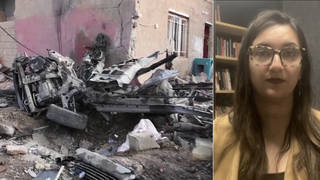
Related
Topics
Kurds, Turkmen and Arabs are competing for control over Kirkuk, Iraq’s third largest city. Turkey recently sent thousands of troops to its border with Iraqi Kurdistan, amassing what is the largest buildup of Turkish soldiers along the Iraq border since 1999. We speak with John Tirman, Executive Director of MIT’s Center for International Studies. [includes rush transcript]
We turn now to Iraq. Middle East analyst Juan Cole recently wrote that there are now four distinct wars being simultaneously fought in Iraq: a Sunni Arab guerrilla war to expel US troops from the Sunni heartland; a militant Shiite guerrilla war to expel the British from the south; a civil war between the Sunni and Shiites; and a Kurdish war against Arabs and Turkmen over the oil-rich city of Kirkuk in Northern Iraq. Today we are going to look at the war being waged over Kirkuk where Kurds, Turkmen and Arabs are competing over control of Iraq’s third largest city. On Tuesday, at least 24 Iraqis were killed in the city in a series of seven bomb attacks. In April, hundreds of Shiite militia men were deployed to Kirkuk, vowing to fight attempts by Kurds to take control of the city. Meanwhile Turkey has recently sent thousands of troops to its border with Iraqi Kurdistan amassing what is the largest buildup of Turkish soldiers along the Iraq border since 1999.
- John Tirman. Executive Director of MIT’s Center for International Studies. He is the author of “Spoils of War: The Human Cost of America’s Arms Trade.”
Transcript
AMY GOODMAN: Welcome to Democracy Now!, John.
JOHN TIRMAN: Thank you.
AMY GOODMAN: Can you first talk about this border that we have not heard very much about, of Iraqi Kurdistan, where how many Turkish soldiers are amassed?
JOHN TIRMAN: It’s been reported 250,000, which — to put that in context, that’s twice as many troops as America has in Iraq.
AMY GOODMAN: 250,000? Yet we have heard almost nothing about it. Why does Turkey have these soldiers on the border?
JOHN TIRMAN: Turkey is concerned about Iraqi Kurdistan becoming independent. That is, peeling off from Iraq and declaring a sovereign state. A lot of people think that’s true, it’s not just the Turks who believe that. And they’re showing a force to intimidate, I think, Iraqi Kurdistan. Several leaders in Turkey, including the army chief of staff and the foreign minister, have said that they would not stand for an independent Kurdistan. So it’s a volatile situation to say the least.
AMY GOODMAN: And the battle within Kirkuk that’s going on right now between the Shias, the Arabs, the Kurds?
JOHN TIRMAN: Kirkuk, which is in a province in the north near the Kurdish areas, about 20 miles from one of the Kurdish provinces, has traditionally been a multiethnic city. The Kurds declare it as it’s historic capital, as one said, “the Jerusalem of Kurdistan.” I think that’s a bit of an exaggeration. Kurds have been a prominent minority, but they have never actually been a majority in Kirkuk, as far as I know. Unfortunately, Saddam Hussein did Arabize the city over a period of time. That is, expelling Kurds and importing Arabs —-mostly Sunni Arabs, some Shiites -— to live in Kirkuk, precisely to keep it from being Kurdish. So it’s a very contested and difficult ethnic mix there. The Kurds now are trying to reclaim their houses legally and through some intimidation and violence.
AMY GOODMAN: John Tirman, your book, Spoils of War: The Human Cost of America’s Arms Trade, is published in Turkey by the same publisher who published Noam Chomsky’s book, and he is once again in trouble, is that right?
JOHN TIRMAN: Fatih Tas is his name, he runs a publishing house called Aram, and he has been provocative in publishing a number of works that challenge Turkish nationalism, and particularly with regard to the Kurdish issue. Turkey, of course, has a large Kurdish minority, many of whom have been active in claiming their rights.
AMY GOODMAN: And so what is happening with him now? Does he face jail time for publishing your words?
JOHN TIRMAN: Well, he had a hearing just yesterday on my book, which the state claims has insulted the military, has insulted Ataturk, the founder of modern Turkey, a number of other things that he has to stand trial for now. And it’s conceivable that he could go to prison for that. Unfortunately, Turkey is tightening its anti-terror laws. It is creating a very nasty situation for writers and publishers. Some 60 have been prosecuted under the anti-terror laws, some of them for Kurdish issues, some of them for discussing the Armenian genocide. So Turkey is undergoing a kind of a reactionary period against freedom of speech.
AMY GOODMAN: Does it have to do with it wanting to join the European Union?
JOHN TIRMAN: It’s in contradiction to that, because Turkey is trying to get into the E.U. and a number of Europeans are pointing out to Turkey that they have treaty obligations and other obligations to uphold freedom of speech and other typical political freedoms. These seem to be the work — these prosecutions seem to be the work of a band of prosecutors, judges and others in the political system that have determined actually to undermine Turkey’s European aspiration.
AMY GOODMAN: John Tirman, I want to thank you for being here, executive director of MIT’s Center for International Studies, the book is called Spoils of War.












Media Options